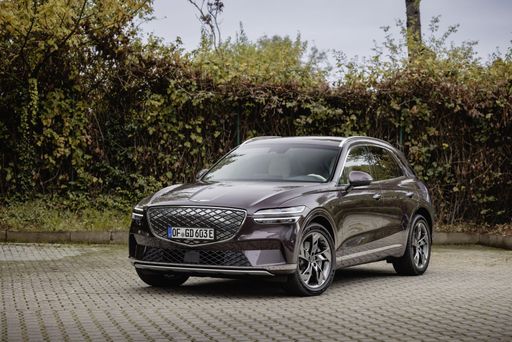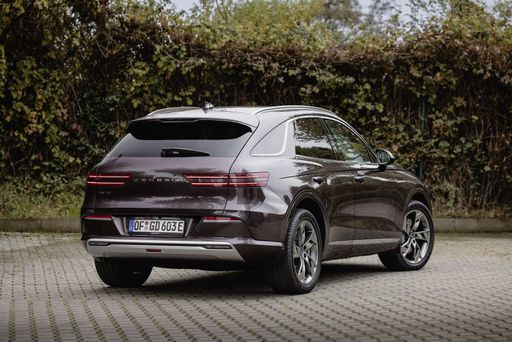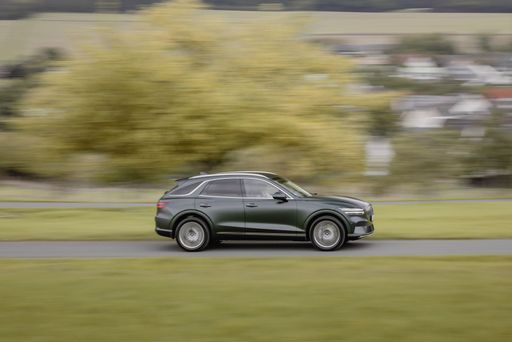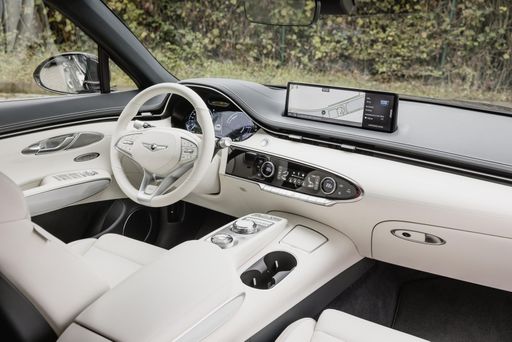Hyundai Tucson vs Genesis GV70 - Differences and prices compared
Compare performance (288 HP vs 490 HP), boot space and price (20900 £ vs 59200 £ ) at a glance. Find out which car is the better choice for you – Hyundai Tucson or Genesis GV70?
Costs and Efficiency:
Price and efficiency are key factors when choosing a car – and this is often where the real differences emerge.
Hyundai Tucson has a decisively advantage in terms of price – it starts at 20900 £ , while the Genesis GV70 costs 59200 £ . That’s a price difference of around 38288 £.
As for electric range, the Genesis GV70 performs significantly better – achieving up to 479 km, about 409 km more than the Hyundai Tucson.
Engine and Performance:
Power, torque and acceleration are the classic benchmarks for car enthusiasts – and here, some clear differences start to show.
When it comes to engine power, the Genesis GV70 has a decisively edge – offering 490 HP compared to 288 HP. That’s roughly 202 HP more horsepower.
In acceleration from 0 to 100 km/h, the Genesis GV70 is decisively quicker – completing the sprint in 4.40 s, while the Hyundai Tucson takes 7.50 s. That’s about 3.10 s faster.
There’s also a difference in torque: Genesis GV70 pulls significantly stronger with 700 Nm compared to 379 Nm. That’s about 321 Nm difference.
Space and Everyday Use:
Cabin size, boot volume and payload all play a role in everyday practicality. Here, comfort and flexibility make the difference.
Both vehicles offer seating for 5 people.
In curb weight, Hyundai Tucson is decisively lighter – 1542 kg compared to 2335 kg. The difference is around 793 kg.
In terms of boot space, the Hyundai Tucson offers somewhat more room – 620 L compared to 503 L. That’s a difference of about 117 L.
When it comes to payload, Hyundai Tucson slight takes the win – 545 kg compared to 515 kg. That’s a difference of about 30 kg.
Who wins the race in the data check?
The Genesis GV70 is decisively ahead in the objective data comparison.
This result only shows which model scores more points on paper – not which of the two cars feels right for you.
Costs and Consumption
View detailed analysis
Engine and Performance
View detailed analysis
Dimensions and Body
View detailed analysis

Genesis GV70
Hyundai Tucson
Hyundai Tucson marries bold, sculpted looks with a clever, roomy cabin that feels smarter than its price tag suggests. It's composed on the road, easy to live with day-to-day, and a sensible choice for buyers who want SUV style without the showroom theatrics.
details




Genesis GV70
The Genesis GV70 pairs coupe-like styling with a sumptuous, high-quality interior that feels more like a bespoke lounge than a typical compact crossover. It drives with composure and poise, offering a supremely comfortable daily companion that quietly challenges established luxury names while giving buyers plenty of premium kit for the money.
details



Costs and Consumption |
|
|---|---|
|
Price
20900 - 47900 £
|
Price
59200 - 64500 £
|
|
Consumption L/100km
2.7 - 7.6 L
|
Consumption L/100km
-
|
|
Consumption kWh/100km
-
|
Consumption kWh/100km
19.40 kWh
|
|
Electric Range
63 - 70 km
|
Electric Range
479 km
|
|
Battery Capacity
-
|
Battery Capacity
-
|
|
co2
62 - 172 g/km
|
co2
0 g/km
|
|
Fuel tank capacity
52 - 54 L
|
Fuel tank capacity
-
|
Dimensions and Body |
|
|---|---|
|
Body Type
SUV
|
Body Type
SUV
|
|
Seats
5
|
Seats
5
|
|
Doors
5
|
Doors
-
|
|
Curb weight
1542 - 1893 kg
|
Curb weight
2335 kg
|
|
Trunk capacity
546 - 620 L
|
Trunk capacity
503 L
|
|
Length
4525 - 4535 mm
|
Length
-
|
|
Width
1865 mm
|
Width
1910 mm
|
|
Height
1650 mm
|
Height
-
|
|
Max trunk capacity
1795 - 1799 L
|
Max trunk capacity
-
|
|
Payload
518 - 545 kg
|
Payload
515 kg
|
Engine and Performance |
|
|---|---|
|
Engine Type
Petrol, Full Hybrid, Plugin Hybrid, Diesel MHEV
|
Engine Type
Electric
|
|
Transmission
Manuel, Automatic
|
Transmission
Automatic
|
|
Transmission Detail
Manual Gearbox, Dual-Clutch Automatic, Automatic Gearbox
|
Transmission Detail
Reduction Gearbox
|
|
Drive Type
Front-Wheel Drive, All-Wheel Drive
|
Drive Type
All-Wheel Drive
|
|
Power HP
136 - 288 HP
|
Power HP
490 HP
|
|
Acceleration 0-100km/h
7.5 - 11.6 s
|
Acceleration 0-100km/h
4.40 s
|
|
Max Speed
196 - 204 km/h
|
Max Speed
-
|
|
Torque
250 - 379 Nm
|
Torque
700 Nm
|
|
Number of Cylinders
4
|
Number of Cylinders
-
|
|
Power kW
100 - 212 kW
|
Power kW
360 kW
|
|
Engine capacity
1598 cm3
|
Engine capacity
-
|
General |
|
|---|---|
|
Model Year
2025
|
Model Year
2025
|
|
CO2 Efficiency Class
F, D, E, B
|
CO2 Efficiency Class
A
|
|
Brand
Hyundai
|
Brand
Genesis
|
What drive types are available for the Hyundai Tucson?
Available configurations include Front-Wheel Drive or All-Wheel Drive.
